
From using your smartphone to track data to reversing your diabetes altogether, these digital health technologies stand out.
Advances in treatments for diabetes never stop coming. Whether that be in the form of insulin pumps or continuous glucose monitors, we’ve seen plenty.
Moving away from the physical device, innovations in the digital diabetes space continue to impress. Digital therapeutics, artificial intelligence- and cloud-based offerings and more comprise an intriguing list of technologies.
Here are seven digital offerings aimed at treating diabetes that you might want to keep an eye on:
1. Digital therapeutics for diabetes
Digital therapeutics is an ever-growing space capable of treating a range of diseases and conditions. That reach extends to diabetes, as shown by companies like Better Therapeutics and DarioHealth.
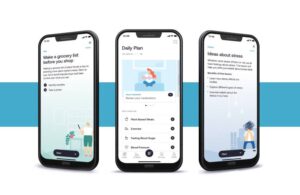
Its study of 668 adults with type 2 diabetes and mean baseline A1c of 8.1% produced evidence of the average A1c reduction in patients using BT-001 improving from 0.3% at day 90 to 0.4% at day 180, supporting that the treatment effects of BT-001 were durable. Additionally, the difference in A1c levels after 180 days between BT-001 and standard of care patients remained statistically significant as more standard of care patients increased blood sugar-lowering medications.
DarioHealth’s technology aims to drive better health habits and behaviors through its AI-driven personalization engine.
Studies have demonstrated improvements in blood glucose readings and target in-range readings with diabetic users. A study of nearly 10,000 members saw a 12% reduction in high blood glucose readings over six months. A second study of more than 11,000 high-risk, type 2 diabetic members saw target in-range readings increase from 28.4% to 54.8% over a year.
The company sees its personalized approach as a way to drive sustainable behavior change for improved clinical outcomes.
2. Virta’s diabetes reversal platform
San Francisco-based Virta launched in 2017 with aims to reverse type 2 diabetes. Physicians and scientists from Stanford, MIT and Harvard founded the company. It designed its technology platform to enable personalized remote care.
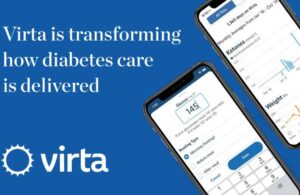
Its offerings include physician supervision, health coaches, an app and biomarker tracking tools. It also provides a personalized nutrition plan for its patients in the hopes of reversing type 2 diabetes.
An early peer-reviewed study showed that Virta successfully reversed type 2 diabetes in half of its clinical trial patients. The technology also eliminated or reduced insulin use in 87% of patients in 10 weeks, the company said at the time.
Recently, through a partnership with U-Haul, Virta conducted a 90-day study for its platform. Outcomes included blood sugar reduction, weight loss, and medication deprescription for participating members. U-Haul team members eliminated 34% of their diabetes-specific medications. A total of 83% either reduced or completely eliminated their insulin.
One Drop’s AI-powered diabetes management system
In a slight variation, One Drop’s all-encompassing platform does include physical devices. However, the digital side still offers some intriguing innovations to consider.
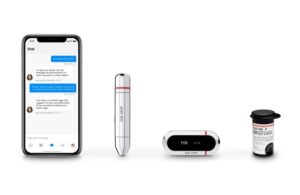
The company said this feature simplifies healthy decision-making by connecting everyday behaviors with outcomes and offering ongoing guidance to complement the support members receive from healthcare providers.
A recent study demonstrated that One Drop is an “economical solution yielding substantial benefits for adults with type 2 diabetes,” the company said.
One Drop’s platform combines connected medical devices with an AI-powered mobile app (iOS and Android, available in 11 languages). It features one-on-one coaching with certified diabetes care and education specialists to enable people with chronic conditions to manage their health.
The company is also developing a minimally invasive health sensor with continuous glucose monitoring (CGM) capabilities. It aims to offer greater flexibility and insights for people with diabetes. Should it garner regulatory approval, One Drop said it will integrate the proprietary sensor with its existing digital offering to augment outcomes and cost savings for those with diabetes and other chronic conditions.
Glytec’s cloud-based insulin management platform
Glytec develops what it calls the eGlycemic Management System (eGMS).
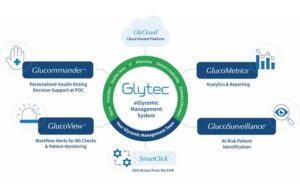
It uses real-time and historical data to recommend insulin dosing by learning each patient’s insulin sensitivity and anticipating future needs, leading to a personalized treatment regime that can reduce hypoglycemia, hyperglycemia, lengths of stay, readmissions and cost of care.
Studies have demonstrated that keeping patients in their target range with Glytec’s eGMS can reduce 30-day readmissions by up to 68% and cut the length of hospital stay by up to 3.2 days.
Glytec CMO Dr. Jordan Messler told Drug Delivery Business News earlier this year that insulin is one of the top three medications in the hospital that can cause adverse events in the management of high blood sugar with the risk of causing low blood sugar. To manage all that, Glytec’s software integrates with electronic medical records (EMRs), making it easier to safely manage insulin.
MIT’s all-in-one offering
At the start of this year, Massachusetts Institute of Technology researchers revealed two devices under development that could improve diabetes care.

Both devices developed by the MIT researchers incorporate a new smartphone app. The app has patients first take a picture of their food. From there, the app estimates the volume of food and the amount of carbohydrates based on nutrient information from a USDA database.
The smartphone camera and deep learning comprise the app that identifies and quantifies food content, which can aid in carbohydrate counting.
Eventually, the technology could aid diabetes patients in the dosing of insulin. The devices developed at MIT include one with a lancet for blood drawing and glucose test strips. The other requires only one needle prick, leading to the design of a glucose sensor to be incorporated into the same needle used for insulin injection. The platform has a flexible electronic sensor that can be attached to the needle and measure glucose in the interstitial fluid below the skin’s surface.
Zillion’s data collection system for members and coaches
Zillion runs the digital health offering for the RestoreHealth program, enhancing RestoreHealth for employer and health system patients.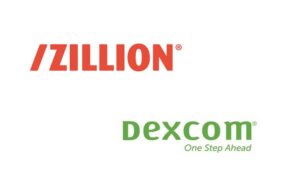
RestoreHealth features personalized, actionable support for employees that address health issues before they escalate. The company’s Zillion platform is a content-agnostic platform. It enables organizations to deliver their programs through a tailored technology and services solution.
A big step for the technology came in July through a partnership with CGM-developer Dexcom. According to Dr. Cate Collings, CMO for Zillion, CGM represents a technological improvement. She said it helps RestoreHealth members and coaches proactively manage real-time health data to allow for adjustments to the plan of care.
“We have seen metabolic disease factor reduction with RestoreHealth,” Collings said. “In some cases, we have been able to successfully decrease disease incidence. We expect to see significant enhancement to these results with this partnership.”
Google’s Onduo by Verily to work on virtual diabetes care
There remains plenty to be seen with this partnership. However, when a Google company is involved, it’s worth keeping an eye out for developments.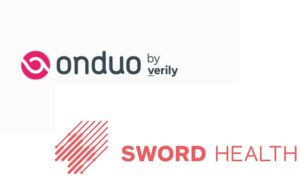
In August, Sword Health, a digital musculoskeletal (MSK) care provider, agreed to work with Onduo by Verily, an Alphabet sister company of Google. The idea is to offer complementary solutions, widening access to virtual care benefits for chronic conditions. That includes type 2 diabetes, hypertension and mental health.
The offerings will be provided through Onduo’s solution, while care benefits for MSK pain will also be available through Sword’s platform. The two companies said they aim to provide virtual support solutions to help users adopt healthier lifestyles more easily.
Onduo’s platform combines an app, personalized health journeys and coaching. Members receive condition-specific monitoring devices that feed into the Onduo engine. They also pick up other clinical and experiential data to help create precise health pathways for users’ needs.

